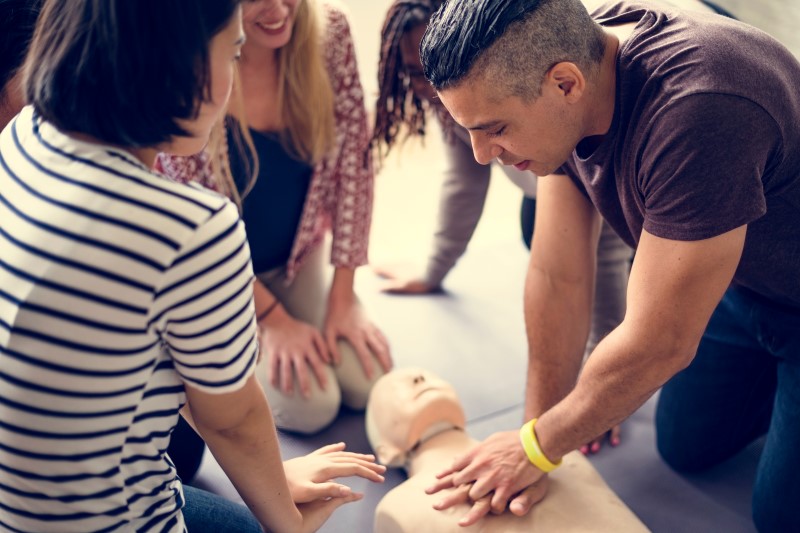
In the heart of Canada, Ottawa residents have access to a variety of high-quality CPR training options. Whether you’re a parent, healthcare professional, or simply someone who wants to be prepared for an emergency, learning CPR can equip you with the skills to potentially save a life. This article provides a comprehensive overview of Ottawa CPR training, including:
Types of CPR Training Available:
- Basic Life Support (BLS): This course covers CPR for adults, children, and infants, as well as choking emergencies. It’s suitable for the general public, parents, babysitters, and workplace safety requirements.
- Standard First Aid with CPR and AED: This course expands on BLS by including first aid skills for various injuries and illnesses. It’s ideal for those who want a more comprehensive skillset for emergency situations.
- Healthcare Provider CPR (BLS-HCP): This advanced course is designed for healthcare professionals and covers advanced CPR techniques and equipment use.
- Other Specialty Courses: Additional courses cater to specific needs, like CPR for infants and children or oxygen therapy and airway management.
Where to Find CPR Training in Ottawa:
- Canadian Red Cross: The Red Cross offers a variety of CPR courses at locations throughout Ottawa. They are a trusted provider with experienced instructors and nationally recognized certifications.
- Independent Training Providers: Numerous private companies offer CPR training in Ottawa. Research their reputation, instructor qualifications, and course content before enrolling.
- Workplace Training: Many employers provide CPR training for their employees as part of their safety program. Check with your workplace to see if they offer training or contribute to your training costs.
Choosing the Right Course:
Consider your needs and goals when selecting a CPR course. Factors to consider include:
- Level of certification required: Do you need basic CPR skills or more advanced training?
- Course duration and schedule: Choose a course that fits your time constraints.
- Cost: Compare prices and any available promotions from different providers.
- Instructor qualifications: Ensure the instructor is certified and has relevant experience.
By taking the initiative to learn CPR, you can become a valuable asset to your community and potentially save a life in an emergency. Choose the course that best suits your needs and enroll today!
Ottawa CPR Training FAQs
General:
Why should I learn CPR?
Knowing CPR can equip you to potentially save a life in an emergency situation. Even basic skills can make a critical difference while waiting for professional help.
What are the different types of CPR training available in Ottawa?
Options include Basic Life Support (BLS), Standard First Aid with CPR and AED, Healthcare Provider CPR (BLS-HCP), and specialty courses like infant/child CPR.
Where can I find CPR training in Ottawa?
The Canadian Red Cross, independent training providers, and some workplaces offer courses. Check the resources in the main article for details.
How much does CPR training cost?
Prices vary depending on the course type, duration, and provider. Expect to pay between $50 and $200.
Choosing a Course:
What level of certification do I need?
BLS is suitable for most people. Consider Standard First Aid for broader emergency skills or BLS-HCP if you’re a healthcare professional.
How long are the courses?
BLS typically takes 4-6 hours, while Standard First Aid can be 8-16 hours. Blended learning options (online + in-person) are available for some courses.
What should I look for in a CPR instructor?
Ensure they are certified and have relevant experience. Check their qualifications and course reviews.
Do I need to recertify my CPR skills?
Yes, most certifications expire every 1-3 years. Recertification courses are shorter than initial training.
Logistics:
Do I need to bring anything to the course?Most providers require participants to wear loose-fitting clothing and bring a pen and notebook. Some may ask for a signed waiver.
Can I cancel or reschedule my course?
Cancellation policies vary by provider. Check their terms and conditions before enrolling.
What happens if I fail the course?
Most providers offer re-tests or allow you to retake specific skills during the course.
Additional Information:
Are there any financial assistance programs available?
Some employers or community organizations may offer subsidies for CPR training. Check with your employer or local resources.
Can I learn CPR online?
While online resources can provide basic information, hands-on practice is crucial for CPR competency. In-person training with a certified instructor is highly recommended.
I have additional questions, who can I contact?
Reach out to your chosen training provider or contact organizations like the Canadian Red Cross or Heart & Stroke Foundation for further assistance.
